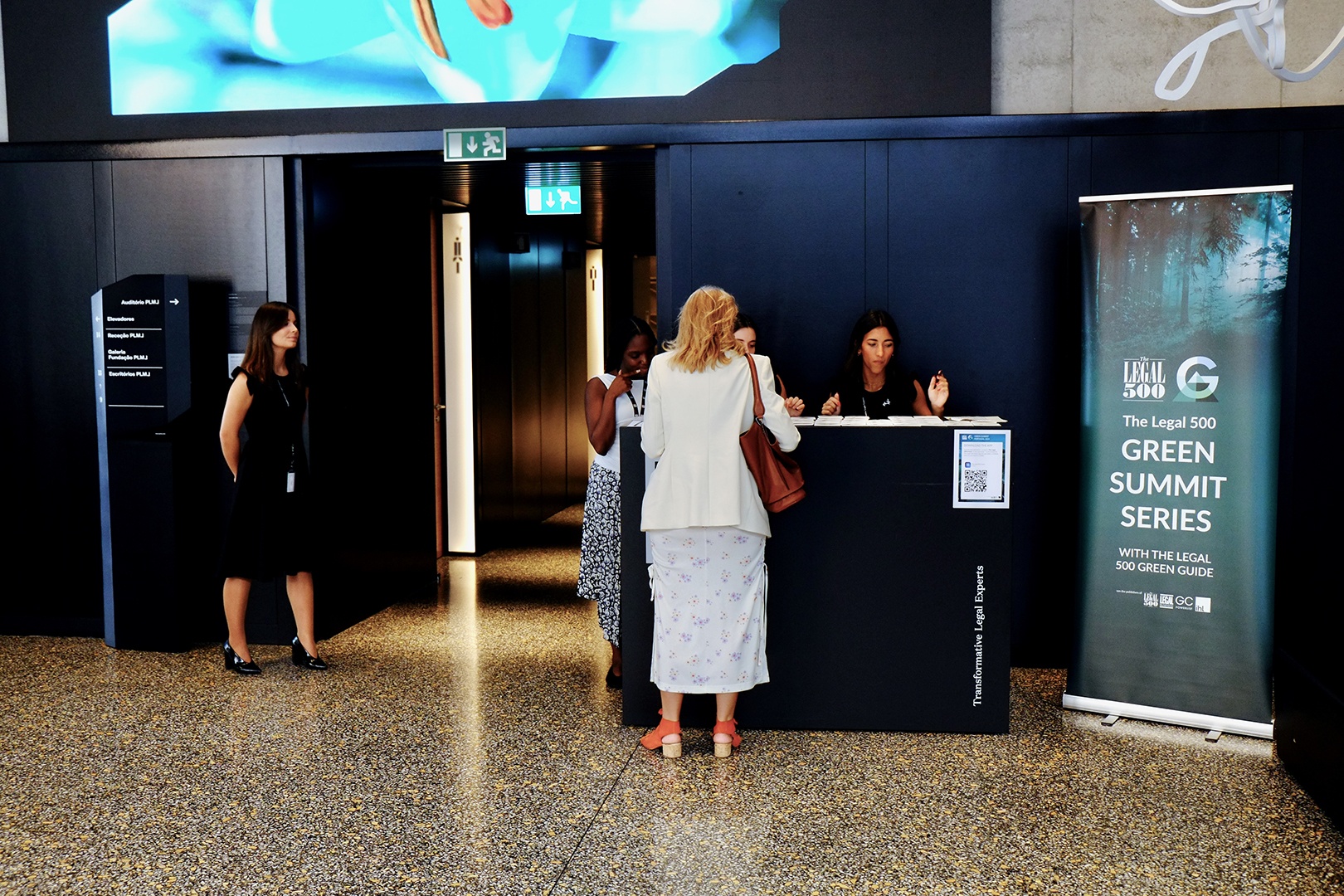Event Report
The Green Summit Portugal 2023 was the second summit held in Lisbon associated with the Global Green Guide. The event brought together leading practitioners from across the country to discuss much needed action to accelerate the green transition. This year, the panel discussions specifically focused on the financial sectors’ engagement and contribution to increased sustainability. Speakers addressed the growing momentum of the transition in the country, but also the many challenges that stand in its way, such as lack of knowledge, inconsistent regulations, and greenwashing.
After a welcome address and opening remarks by Legal 500 Global Green Guide researcher Maya Sainani and Bruno Ferreira, managing partner at PLMJ, the two panels were moderated by Raquel Azevedo, partner in PLMJ’s banking and finance and capital markets practices, and Ferreira respectively.
Panel 1: Investors: Key drivers of a green transition
The first panel started off with João Pedro Machado, president and board member of Fundação Ageas, discussing how the corporate foundation, which is part of the Ageas Portugal Group and was created 25 years ago, strategically reviewed its operations in 2021 in an effort to adapt to the growing need for social action in Portugal. With a goal to find the correct instruments, financial or otherwise, to help clients make a long-term positive social impact, Ageas created a new pillar of impact investment as well as a specialised group to deal with social projects. Machado concluded that whilst many investors give the same importance to impact and financial gain, or often prioritise financial before ESG considerations, Ageas aims to take a truly sustainable approach by always putting impact first.
Cristina Almeida, partner at MAZE Impact, elaborated on the main challenges facing the impact investment company Maze, as well as the main obstacles when it comes to reporting and transparency for companies investing ESG projects. Maze launched earlier in the year with the vision that social and environmental issues are not separate but rather intertwined. The organisation wants to leverage the fact that in Europe the number of environmental and social impact funds are rapidly increasing. Almeida highlighted that whilst the impact investing market is growing, there are still many investors who are wary of investing in early-stage ESG projects. This is a result of a number of factors, most prominently including the lack of credible reporting. In Portugal, there is no standard set of reporting for companies to follow, causing a lot of confusion. Additionally, when companies publish their green/social claims, those often aren’t verified, leading to a risk of greenwashing.
According to Sofia Santos, CEO and sustainability champion in chief at Systemic, companies which don’t adapt to the new, growing ESG landscape will lose clients and rapidly fall behind in the market. Santos discussed the main challenges faced by companies adapting to the new regulatory landscape. She doubled down on Almeida’s point that regulations around reporting in Portugal aren’t very certain at the moment, while also suggesting that companies and people will need to adapt to that uncertainty for a while, and accept the risks that come with it, as ESG is here to stay. Santos also commented on the ways different stakeholders can improve their approach and understanding around the green transition. Notably, she proposed lawyers should attempt to better understand the science behind the green transition, or work with people who understand the science. This would enable a more encompassing approach and ultimately, more effectively help the planet.
Panel 2: Banks & banking clients: From compliance to long-term value creation
The second panel began with Cristina Casalinho, executive director of sustainability at BPI, speaking about how financial institutions approach the new wave of regulatory requirements relating to green investments. She explained that nowadays, many banks integrate sustainability risks into their decision-making processes. She also elaborated on the main ways in which banks can help clients finance green projects, such as educating them on the importance of these projects and providing guidance from a financial perspective. While there are still many challenges surrounding green investments, Casalinho highlighted the importance of making it clear to companies that regardless, the green market is an opportunity for profit – there is a huge economic benefit to be gained from investing into the green transition.
Susana Antunes, ESG director at Santander Portugal, addressed the challenge of having different regulatory requirements in different countries. Working in an international bank gave her many insights on this and on tools that can be used to overcome these challenges, such as having a knowledgeable, and international, legal team. According to Antunes, some of the main obstacles faced by banks when it comes to the green transition are a lack of knowledge around regulatory requirements and a lack of disclosure. She also discussed the many ways in which banks are promoting green investments and sustainable companies, such as educating clients on the financial benefits of a green transition.
Filipa Saldanha, director of sustainability at Crédito Agrícola, shone light on how being transparent about green goals and achievements impacts organisations internally and externally, including how it affects stakeholder relationships or motivates teams. She also discussed how different branches of a financial institution can collaborate to facilitate increased sustainability, making it clear that the green transition will require a ‘brutal change’ in our economic system. According to Saldanha, one of the most important things to do right now is to avoid greenwashing by getting verified data and not blindly trusting companies’ claims.
Inês Soares, head of ESG and sustainability at Novobanco, spoke about how financial institutions manage environmental risks in their investment operations. She highlighted that as financial institutions they must look at ESG risks as financial risks. She also delved into the ways in which banks can educate its clients about emerging green themes, stressing that we need to see a lot more collaboration between banks and businesses.
The summit concluded with some closing remarks from Sainani and Pedro Siza Vieira, partner at PLMJ, followed by a reception with drinks and canapes at the firm’s balcony with a view over Lisbon.

